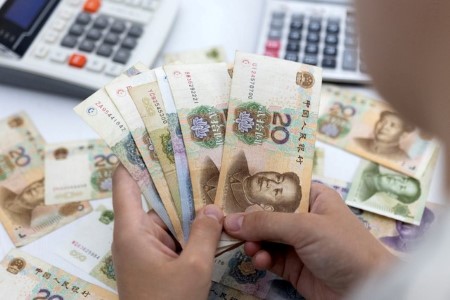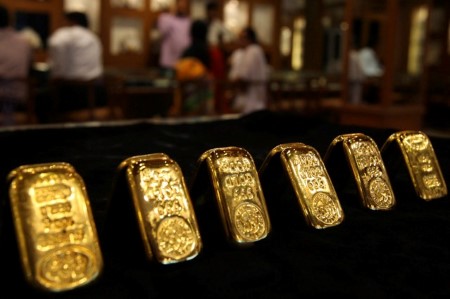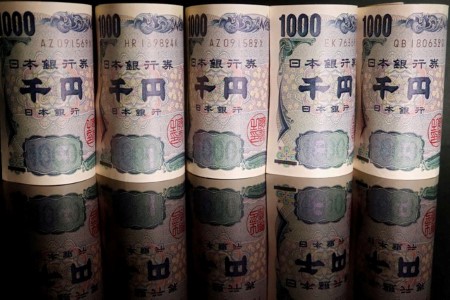SINGAPORE, April 27 (Reuters) – China’s yuan currency is slowly but surely being adopted for more international payments, which analysts say could lay the foundations for a trade system running parallel to the dominant US dollar.
In the past day alone, data showed that more cross-border transactions with China were settled in yuan in March than in dollars for the first time and that Argentina said it aims to regularly pay for Chinese goods in yuan and not dollars.
While the dollar dominates world trade settlements, the news comes amid a steady drumbeat of more and more bilateral deals arranging yuan payments with China — from Chinese oil purchases in the Middle East to trade with partners from Brazil to Russia.
True global yuan adoption is unlikely, given expectations that Beijing will want to keep a tight grip on the currency. But incremental progress is already fashioning a new trade architecture and is gaining pace, particularly as Russia’s expulsion from much of the West’s payment systems has accelerated the development of alternatives.
“The world’s largest commodity exporters and importers – China, Russia, and Brazil – are now working together on using renminbi for cross-border payments,” said Chi Lo, senior investment strategist at BNP Paribas Asset Management in Hong Kong.
“Their cooperation could draw other countries to renminbi payments over time and cumulatively, this group could lift the renminbi at the expense of the dollar,” he said.
China has long sought to increase the yuan’s undersized 2.2% share of global payments, but seemingly without being willing to open its capital accounts and allow the sort of free-flowing movement that makes dollars, euros, and yen so convenient.
Russia’s war on Ukraine, and the resulting Western sanctions, have given substance to the push. Suddenly, Russia has come from virtually nowhere to become the fourth-largest yuan-trading hub outside China.
The yuan’s share of Russia’s currency market has leaped to 40% to 45%, from less than 1% at the start of last year. Its share of world trade financing, according to SWIFT, has increased to 4.5% in February from 1.3% two years ago. The dollar’s is 84%.
“It will not replace the US dollar globally, but it is already starting to replace the dollar in some of China’s trade relationships,” said Gerard DiPippo and Andrea Leonard Palazzi, economists at Washington’s Center for Strategic and International Studies, in an article last week.
“This kind of renminbi internationalization may achieve Beijing’s goals, including reducing China’s exposure to exchange rate fluctuations and mitigating China’s vulnerabilities to US financial sanctions.”
SLOW MOVING
World trade flows are dominated by dollars, euros, sterling, and yen because those currencies are freely available and connected to open economies in ways the capital-controlled yuan is not. To be sure, there are no signs that is changing.
“In most trades, importers have a comparative advantage in determining the terms of trades, such as pricing and settlement currency,” says Zhang Yu, chief macro analyst at Huachuang Securities in Beijing.
“Therefore, if exporters want to use yuan to settle trades, they must persuade foreign importers to pay in yuan, which often takes a long time.”
China itself needs time to create depth in a limited pool of yuan outside its shores, which is less easy for Beijing to control.
“For yuan usage to grow in scale it may take 10 years or longer,” says Andre Wheeler, chief executive of supply chain, trade risk consultancy Wheeler Management Consulting based in Australia.
“If they were to try to change Australia’s iron ore trades to be settled in yuan, I don’t think China would be able to cope with that scale.”
Yet the yuan offers other attractions to China’s trading partners. In Argentina’s case, buying goods in yuan saves draining dwindling dollar reserves. More broadly, each new adopter adds to a currency system’s depth and usefulness.
“One of the many reasons for using the dollar is what we call network effects,” said Michael Pettis, senior fellow at Carnegie China.
“The more of us that use it, the cheaper it becomes to use and the more efficient it becomes to use,” he said.
“By trying to force more and more of its trade into renminbi, Beijing is trying to create network effects that will make use of the renminbi for trade that much easier and with lower frictional costs.”
(Reporting by Tom Westbrook, additional reporting by Samuel Shen and Winni Zhou in Shanghai, Georgina Lee in Hong Kong; Editing by Vidya Ranganathan and Kim Coghill)







 DOWNLOAD
DOWNLOAD







